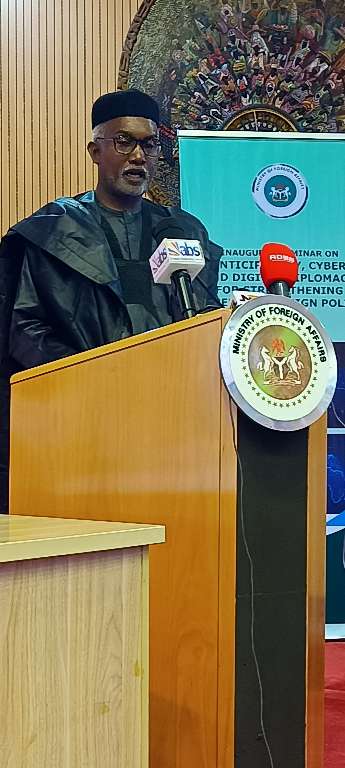By Ameh Gabriel
Nigeria’s leading foreign policy voices have cautioned that the country risks losing sovereignty, security, and global relevance unless it urgently embraces cyber and digital diplomacy.
Speaking at a High-Level Seminar on Anticipatory, Cyber and Digital Diplomacy held Tuesday in Abuja, Minister of Foreign Affairs, Ambassador Yusuf Maitama Tuggar, Attorney General of the Federation (AGF), Prince Lateef Olasunkanmi Fagbemi, SAN, and international relations expert, Dr. Nnenna Ifeanyi-Ajufo, emphasized that Nigeria must act swiftly to shape the emerging global digital order.
Ambassador Tuggar described disruptive technologies, militarization of cyberspace, and shifting geopolitics as forces “fundamentally rewriting diplomacy.” Nigeria, he said, cannot afford to be a bystander.
“We must act with purpose to position ourselves as a principled, capable, and forward-looking actor in the evolving global digital order,” Tuggar declared.
The Minister announced the establishment of a Cyber Diplomacy Unit within the Ministry of Foreign Affairs to coordinate Nigeria’s cyber-related foreign policy. He also unveiled a Masterclass Series on Cyber and Digital Diplomacy to train diplomats across Africa and the Global South, calling it Nigeria’s “digital gift to the world.”
Highlighting risks already affecting Nigeria—including crypto-driven crimes, online disinformation, and weak digital regulation—Tuggar stressed that cyber diplomacy must “help systems catch up” to promote growth, stability, and freedom.
Attorney General Fagbemi echoed the urgency, arguing that traditional diplomacy is inadequate in today’s interconnected world.
“The rise of a globally interconnected digital landscape presents both unprecedented opportunities and complex challenges, rendering traditional diplomatic methods insufficient,” he said.
He urged Nigeria to adopt anticipatory diplomacy detecting threats before they escalate—backed by strong legal frameworks for artificial intelligence, cybersecurity, and ethical technology use.
International relations expert Dr. Nnenna Ifeanyi-Ajufo sharpened the warning, insisting that sovereignty and power are now being contested in data centers, digital platforms, and artificial intelligence, not on battlefields.
“Influence is being forged in cyberspace. Nations that will thrive in the 21st century are those that adapt swiftly, think ahead, and engage globally. Nigeria must not be left behind,” she said.
Dr. Nnenna outlined a six-point action plan for the Ministry of Foreign Affairs, including:
Establishing a Directorate of Future Diplomacy,
Developing a national cyber strategy,
Building regional and global partnerships,
Creating a Foreign Policy AI Lab,
Training diplomats in AI ethics and digital literacy, and
Reforming diplomatic curricula to integrate foresight and technology policy.
She concluded: “The future is being written now in algorithms, cyber norms, and digital platforms. Nigeria’s influence depends on its innovation. Our resilience depends on our readiness.”
The seminar drew participation from National Security Adviser Mallam Nuhu Ribadu, British High Commissioner Richard Montgomery, African Union cybersecurity experts, and other diplomats. The gathering underscored a consensus: Nigeria’s survival and leadership in the 21st century will depend not on oil or military power, but on its ability to anticipate, secure, and dominate the digital frontier.



